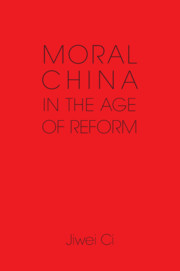Book contents
- Frontmatter
- Dedication
- Contents
- Acknowledgments
- Introduction
- 1 An Anatomy of the Moral Crisis
- 2 Political Order, Moral Disorder
- 3 Freedom as a Chinese Question
- 4 Freedom and Its Epistemological Conditions
- 5 Freedom and Identification
- 6 Neither Devotion Nor Introjection
- 7 The Insult of Poverty
- 8 Democracy as Unmistakable Reality and Uncertain Prospect
- 9 Freedom’s Unfinished Task
- 10 China’s Space of Moral Possibilities
- Index
- References
4 - Freedom and Its Epistemological Conditions
Published online by Cambridge University Press: 05 September 2014
- Frontmatter
- Dedication
- Contents
- Acknowledgments
- Introduction
- 1 An Anatomy of the Moral Crisis
- 2 Political Order, Moral Disorder
- 3 Freedom as a Chinese Question
- 4 Freedom and Its Epistemological Conditions
- 5 Freedom and Identification
- 6 Neither Devotion Nor Introjection
- 7 The Insult of Poverty
- 8 Democracy as Unmistakable Reality and Uncertain Prospect
- 9 Freedom’s Unfinished Task
- 10 China’s Space of Moral Possibilities
- Index
- References
Summary
1
The account of freedom in the last chapter is informed by the idea that freedom is (the name of) a configuration of agency, a culturally specific way of giving form to the human need for agency while catering to the no less basic human need for order. This is not a familiar approach to freedom, still less a standard one, and I will need to say more about it by way of elaboration and justification, especially by considering freedom alongside another, very different configuration of agency. Before I do so in the next chapter, I want to discuss in this chapter a more familiar or standard approach to freedom as presented by Thomas Metzger in his important book, A Cloud across the Pacific.
There are two reasons why this work by Metzger is a particularly suitable object for analysis in this context. First, Metzger addresses with considerable incisiveness and intellectual daring what one may call the background discursive conditions of freedom, especially as they pertain to epistemology, and such conditions must figure in any effective attempt to shed light on freedom as a human construction. Indeed, Metzger devotes most of his book to a wide-ranging treatment of such, especially epistemological, conditions, and in commenting on him I shall cover roughly the same issues. Second, Metzger pursues the question of freedom in a comparative context involving China and the West. This is exactly the kind of comparative context in which I myself find it necessary to take up the issue of freedom again in Chapter 5 as a complement to my own account of freedom in Chapter 3.
- Type
- Chapter
- Information
- Moral China in the Age of Reform , pp. 63 - 87Publisher: Cambridge University PressPrint publication year: 2014



